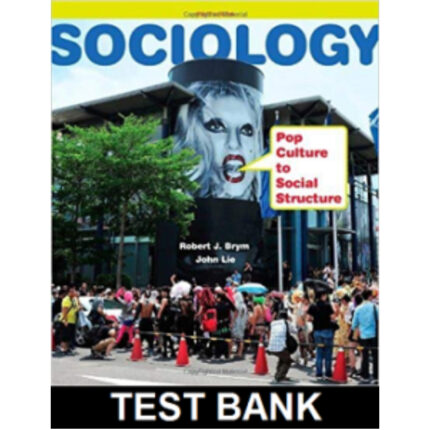Overview
Chapter 11
Social Movements, Social Change, and Technology
Multiple Choice Questions
- Social change refers to
A.a theory that holds that society is moving in a specific direction.
B. a view of society as tending toward instability.
C. significant alteration over time in behavior patterns and culture.
D. a view that society is moving in several different directions at the same time.
Type: D
- Which term refers to a significant alteration in behavior patterns and culture over time?
A.social movement
B. social change
C. social status
D. social system
Type: D
- Which term is used by sociologists to refer to organized collective activities aimed at bringing about fundamental changes in existing society?
A.social movements
B. social groups
C. power movements
D. pressure groups
Type: I
- Which of the following would be an example of a “social movement”?
A.activists who were opposed to the war in Iraq
B. people who organized for or against abortion rights
C. the civil rights movement of the 1960s and 1970s
D. all of these
Type: C
- Which term refers to the conscious feeling of a negative discrepancy between legitimate expectations and present actualities?
A.relative deprivation
B. relative mobilization
C. resource deprivation
D. resource mobilization
Type: D
- Which of the following best illustrates relative deprivation?
A.A group of sweatshop workers who are incapable of buying an adequate diet for their families.
B. Residents of a squatter settlement in Nigeria who are incapable of affording adequate housing and plumbing.
C. Middle management workers in a corporation who are discontented because they cannot afford the luxury cars or expensive homes that their bosses have.
D. none of these
Type: C
- Which term is used to refer to the ways in which a social movement utilizes such resources as money, political influence, access to the media, and personnel?
A.relative deprivation
B. relative mobilization
C. resource deprivation
D. resource mobilization
Type: D
- Which of the following is not relevant to an understanding of resource mobilization
A.leadership.
B. money.
C. political influence.
D. political radicalism.
Type: P
- False consciousness is
A.Marx’s concept for actions that do not reflect the objective position of workers.
B. Parson’s concept for a state of euphoria when stability is achieved.
C. Marx’s concept for attitudes that do not reflect the objective position of workers.
D. Leary’s term for a false sense of self that is drug-induced.
Type: D
- Which sociological perspective would likely stress that social movements should require leaders to sharpen the awareness of the oppressed, who may suffer from false consciousness?
A.functionalist perspective
B. conflict perspective
C. interactionist perspective
D. epidemiological perspective













Reviews
There are no reviews yet.